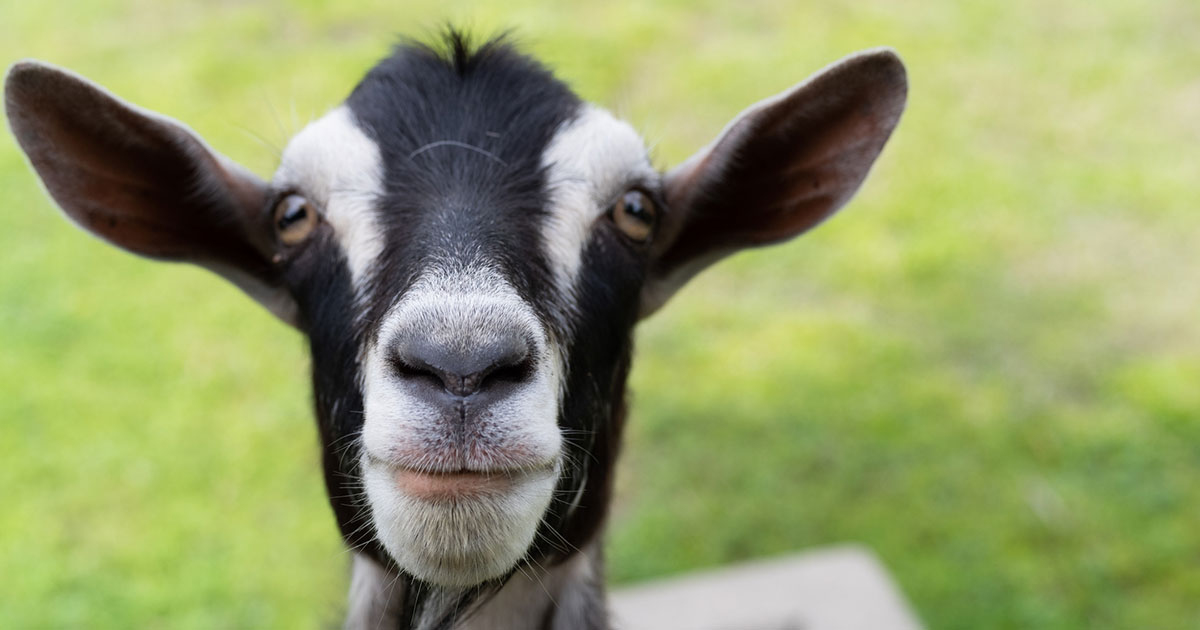
I was talking to an experienced farmer a few years ago about my little farm. I had a few goats, hogs, and chickens. I told him, “I hate goats!” In truth, I do not actually hate goats, but I had developed a dislike of those on my farm.
After making this strong statement, I felt the need for further explanation. I said that goats are obnoxious:
They are never satisfied.
They always complain.
They are insatiably destructive.
They are unrepentantly entitled.
They are downright suicidal -- every attempt to protect them with fencing is merely a simple challenge erected to keep them from being bored.
I elaborated further with a story: I had prepared a field with the best grass forage, seeding, watering and protecting it as it grew lush, with the goal of providing a nutritious bounty for my goat herd. I even put a predator-proof fence around it to ensure their safety.
Then I let the herd of goats in.
 Peter S. Trotter, Illinois 2000, is vice president, general counsel, and secretary of Mason Companies, Inc., in Chippewa Falls.
Peter S. Trotter, Illinois 2000, is vice president, general counsel, and secretary of Mason Companies, Inc., in Chippewa Falls.
On the first day, they proceeded to mow a path around the outside of the field along the fence, but on the
outside of the fence, reaching their heads through the fence to eat anything they could reach outside of the field but barely touching the lush grass inside the fence. Then, when I walked to the field the next morning, they incessantly complained about the veritable wasteland they were in, even though they had acres of fresh, untouched grass.
The farmer listened, a smile at the corners of his mouth. Then he asked whether I had poison ivy. I said I did when I moved to the farm, but it was gone because the goats seemed to like it.
He asked whether I had cleared any brush when I moved to the farm. I said that I did have a lot of brush, but the goats had cleared any brush within their reach, making it easier for me to finish off what remained.
He asked whether the goats killed any other animals. I said that they got along with the chickens and hogs, and even with the dog and cats. Did they provide anything to the farm? They certainly contributed to farm production. What about their entertainment value? I had to admit that there may be nothing cuter than a baby goat, and even the antics of the adults could make you laugh.
Actually, I was Intolerant
The farmer leaned back and asked me if I really hated goats. I realized that goats were an irritation to me merely because they did not always behave as I preferred.
Goats are a unique animal. They are not like chickens, so they do not have some of the attributes of chickens, such as the way chickens reliably put themselves to bed at night, or the massive food production of a good laying hen.
Goats are also not like hogs, so what might suffice for a hog – simple feed, fresh water, shelter, delightful mud baths – will not satisfy a goat.
But chickens and hogs do not salivate for noxious weeds. They do not clear brush with a vengeance. They will hurt each other to a degree that is rare with goats, even if goats may butt heads now and then.
And when was the last time a chicken or a hog gave you a belly laugh?
In short, goats have a place on the farm. They bring value that only they can bring. My irritability toward them was merely a reflection of my intolerance, not the merit of the goats. If I could become more tolerant of goats, my farm would be better off.
Why Am I Talking About Goats?
This lesson from the farm has broader implications.
Tolerance is as a hallmark of a democracy. Many of the original colonists came to America to escape intolerance. While they may have been hypocritical at times, they created a society that valued and prioritized tolerance, as reflected in our Constitution.
That is not to say that our society has been mistake-free, and intolerance has often run rampant. We live in a time where intolerance appears to be on the upswing. Commentators regularly speak about divisiveness in our country, and even our profession has not escaped this concerning trend.
Humans vary widely in their characteristics, personalities, and behavior. It is normal to like some people and to dislike others. It is also easy to see the value in some people and to discount the value of others.
However, this normal reaction to differences between people can grow into intolerance. The farm lesson about tolerance for goats shows how the potential for intolerance between humans can be managed.
Humans can control our emotions and behavior, and this control is central to tolerant behavior. What we need is motivation, self-awareness, self-discipline, and sometimes guidance.
Why Tolerance Is Important for Attorneys
As for motivation, attorneys are not expected to be perfect, but we are expected to hold ourselves to a high standard. We swear an oath reflecting the values that we are to support and uphold, and some might suggest that we should live and promote these values. Tolerance is inherent in these values.
If we are properly motivated, as we should be, we should be attuned to our own emotions and capable of sensing when our emotions threaten to make us intolerant. We should have a sort of intolerance radar to warn us of the threat of approaching intolerance. When that radar goes off, we should assert control over ourselves and prevent that intolerant behavior.
Self-discipline can be an important skill that attorneys develop and maintain, but exerting this control can still be very hard. One way that may help is to look for the positive and to avoid focusing on the negative. Recognizing the positive attributes of the object of potential intolerance makes it easier to control emotions and rising feelings of intolerance.
Perhaps a person that we see as being obnoxious is instead a strong person whose strength is an attribute to the workplace. A person we see as having lower value because they do not produce results as fast as we would like is actually an asset due to their methodical, analytical nature. A person we see as absentee – too quiet and never contributing – has never been asked for their input or provided with a legitimate opportunity to participate.
Being a Better Role Model
But our profession can do more than to merely manage our own intolerance – we should look for opportunities to reduce intolerance in our society.
We are often in the position to perceive intolerance and to respond. Attorneys can be intelligent, perceptive and engaged, which can enhance our ability to identify intolerant behavior.
We are also often in positions of expertise, responsibility and authority, whether we are in private practice, in the courtroom, in governmental roles, serving as inside counsel in companies, or in other positions of leadership.
We can become positive role models for tolerant behavior. We can command respect and provide lucid, forceful guidance and behavioral leadership – both living and verbalizing our values.
Some differences between people and some behaviors of others should certainly be intolerable – for example, no one should tolerate bigotry.
But aside from such extreme, harmful differences and behavior, we should support tolerance for differences and oppose meritless intolerance. We should promote the recognition that attributes vary widely between individuals. Metaphorically, we should understand that a “goat” can bring value to a “farm” with “chickens” and “hogs” in various situations, such as if there is “brush” that needs to be removed. We should reject arguments for destructive intolerance, using our skills to eviscerate the fallacies of such arguments.
We Can All Encourage a Better ‘Farm’
If we speak up, we can promote thoughtful, rational, and humanistic responses that squelch intolerance and promote appropriate behaviors and positive results.
We may not always be successful in this effort, but I believe that it is worth the effort. The result might be a better “farm” for all of us in which we can all live, work and grow.
This article was originally published on the State Bar of Wisconsin’s
Business Law Blog. Visit the State Bar
sections or the
Business Law Section webpages to learn more about the benefits of section membership.
